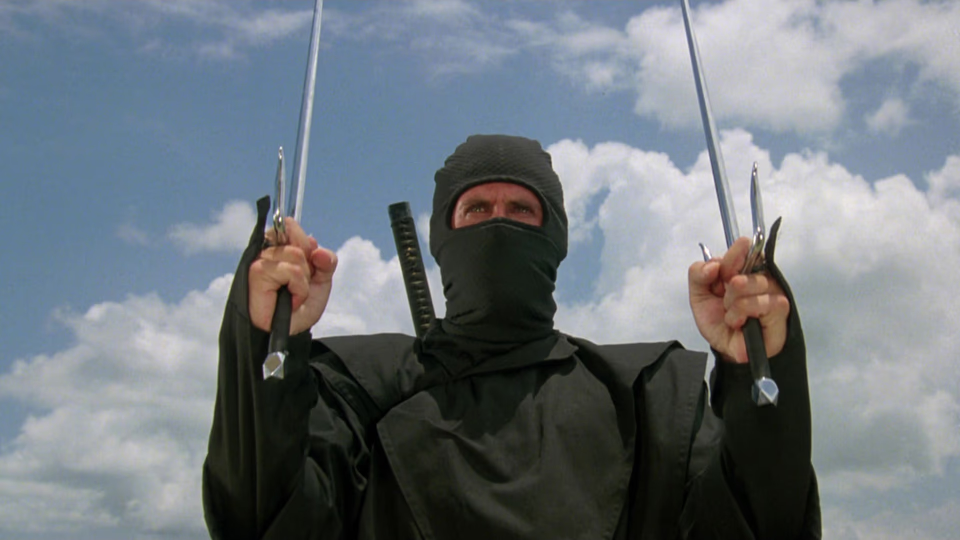American Ninja

American Ninja is an often laugh-out-loud satirical comedy from Cannon masquerading as a B-movie martial arts actioner. Though I’m not sure all the performers were in on the joke.
Set in the Philippines, the story centers on Joe, played by Michael Dudikoff, an Army private who uses his Ninjitsu training to foil a conspiracy involving a black market arms dealer backed by a squadron of ninjas.
I confess, despite the ridiculous plot, it took me over thirty years to pick up on the satire.
I should have realized it sooner. The opening scene has Dudikoff leaning up against a truck. He’s doing his best James Dean impression, but the vacant effect might have inspired Ben Stiller’s Zoolander character. To hammer the absurdity home, the script proffers a group of nearby soldiers playing hacky-sack, and when the sack flies toward Dudikoff and they ask him to throw it back, he’s too cool to even reply.
Dudikoff’s pulp performance continues when he’s part of an ambushed motorcade. When the hijackers threaten the Colonel’s daughter, played by Judie Aronson, Dudikoff springs into action, dispatching the hijackers with robotic ease, all while maintaining the same vacant petulant stare.
Continuing the exaggerated performances, Aronson over-emotes to a comical degree, verbalizing her mile-a-minute inner monologue including worrying about her couture as assassins pursue her.
As the action returns to the military base, we get Steve James playing Corporal Jackson. His introductory exchange with the Colonel proves the script’s satirical intent:
COLONEL
Jackson!JACKSON
Yes, sir.COLONEL
Did you get a chance to check the wounds?JACKSON
Yes, sir, I did.COLONEL
What the hell did you find out?JACKSON
Have you ever heard of Ninjitsu, sir?COLONEL
What’s that?JACKSON
The secret art of assassination.COLONEL
Of course I have!
Unlike Dudikoff and Aronson, James seems in on the joke, almost winking at the camera during many of his scenes. This could have proved fatal, but James’s innate charisma outshines the rest of the cast. He plays the material perfectly, deadpanning the early absurdity before going over-the-top for the finale which sees him leading a cavalry charge atop an armored vehicle, sleeveless, muscles glistening like Rambo, using a belt-fed machine gun to mow down bad guys.
The production belies the meager budget. It sports tons of extras and leverages the Philippine locales to maximum effect, setting the action on jungle roads, packed warehouses, a palatial estate, and a bustling dock.
The stunt work also shines. Ninjas fall from trees, roofs, and other heights. We get ninjas thrown through windows and jumping on flying helicopters. There’s even a slow-motion motorcycle jump over the barracks wall. In a standout sequence, the aforementioned dock sees a motorcycle chase an Army cargo truck, leading both to barrel through the assorted street vendor stands before the truck turns the tables and overtakes the motorcycle, crushing it under wheel. With the help of some cracker-jack editing, it looks like a continuous scene where Dudikoff, on the motorcycle, gets bumped by the truck, reaches back to grab the truck’s grill as the motorcycle goes under, then lowers himself under the still moving truck.
Director Sam Firstenberg also delivers some memorable visuals, including a shot where, as ninjas enter an office to ambush Dudikoff, we see their shadows in the windows, then some sounds of fighting before the ninjas’ bodies come flying out through the windows, landing dead on the ground. Firstenberg even handles the small touches, like the key-light on Dudikoff’s face when he’s sitting in a military prison cell.
Hopefully, I’ve made a case for American Ninja being more than a so-bad-it’s-good comedy, but for those still unconvinced, consider this scene:
It’s night. Dudikoff has escaped in a jeep. Military police give pursuit in jeeps of their own, headed by a corrupt First Sergeant. The jeeps careen around the dark roads. In tight shots of the drivers, they seem to be speeding, as the First Sergeant tries to draw a bead on Dudikoff with his side arm.
But then Firstenberg cuts to a wide shot and we see the jeeps are moving at a relatively lackluster pace. Like how you might drive around a winding suburban neighborhood. The earlier scenes show the production was capable of dangerous stunts, and Firstenberg didn’t have to include these shots, yet he repeatedly cuts to these wide shots betraying the illusion.
Then the payoff. Dudikoff forces the First Sergeant off the road and down a small gully. Cut to the First Sergeant screaming, “Nooooo!” then a wide shot as his jeep runs into a tree barely larger than an office bamboo at fender-bender speed.
Then the jeep explodes in a screen-filling fireball.
I laughed aloud.
The deadpan absurdism doesn’t stop there. I haven’t even mentioned the chief goon, whose actual name seems to be “Black Star Ninja,” and has a literal ninja star tattooed on his cheek, which he doesn’t even try to cover with his ninja mask. Or the several scenes where Dudikoff evades scores of bullets fired by machine-gunning goons mere yards away.
The film proffers all of this with a straight face, leading my younger self to take it at face value. But now, I can’t help but see it as an intentional satire.
American Ninja was the fourth picture in Cannon’s ninja cycle that began with Enter the Ninja in 1981, followed by the Firstenberg-helmed Revenge of the Ninja in 1983. Firstenberg also directed the third film, Ninja III: The Domination in 1984, but it under-performed at the box office. This may have influenced Firstenberg to try a less serious approach, or engendered a sense of cynicism that manifested in the satire. It’s also possible that, like Jack Sholder with A Nightmare on Elm Street 2: Freddy’s Revenge, Firstenberg’s intent was subconscious.
Regardless, like Sholder’s film, American Ninja deserves a critical reappraisal as a satire.